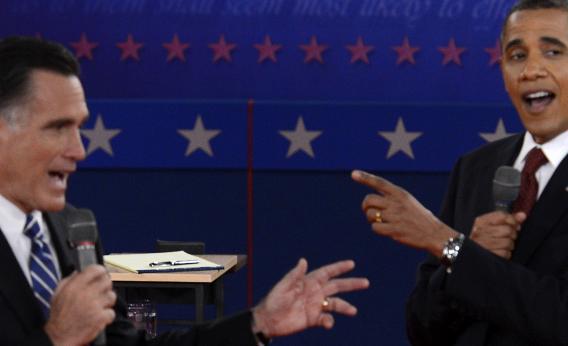Anyone rusty on their boxing lingo should look no further than this morning’s papers. To hear the press tell it, the gloves came off on Tuesday night as President Barack Obama and Gov. Mitt Romney sparred, jabbed, and swung their way through a fiery second presidential debate. But for all the swirling dust, many outlets seem hesitant to declare a winner. Not so the latest Slate/SurveyMonkey poll. We posted our questions as soon as the Hofstra University stage went dark and collected (surprisingly decisive) responses until 9:00= a.m. EST on Wednesday. (Information on respondents is available here. More information about SurveyMonkey Audience is here.) Scroll down for a window into what the electorate is thinking just six days before the bell rings for the final round.
While President Obama received lackluster reviews for his performance during debate No. 1, viewers saw a changed man on Tuesday—tough, spirited, and willing to chase down his opponent’s evasions. (Thanks to the looser town hall format, both men also did some literal stalking of each other around the perimeter of the debate floor). When we asked, “Who do you think won the debate, Mitt Romney or Barack Obama?” Nearly 57 percent of respondents chose Obama. Only 18.9 percent named Romney the victor, 12.2 percent thought it was a tie, and another 12.2 percent were unsure.
Next, we invited survey takers to rank each candidate on a scale of persuasiveness. Again, a large gap opened up between the two candidates. “How effective do you think Mitt Romney was in last night’s debate?” we asked. The largest plurality, 33.1 percent, damned the governor with faint praise, calling him “moderately effective.” Meanwhile, a combined 28.7 percent pronounced him either “extremely” or “very” effective, while 38.2 percent saw his performance as either “slightly” or “not at all” effective.
Democrats should enjoy comparing those numbers to Obama’s tally. Almost 40 percent of respondents found the incumbent “very effective.” Another 20.9 percent said he was “extremely effective,” 25.8 percent called him “somewhat effective,” and only 14.4 percent judged him to be either “slightly” or “not at all” effective.
Unsurprisingly, survey takers also observed a steep learning curve for Obama as a debater. When we asked whether the president acquitted himself better or worse in Long Island than in Denver, 52.7 percent replied, “Much better.” (Another 35.8 percent said “slightly better,” and a sliver chose the remaining options, “neither better nor worse,” “slightly worse,” or “much worse.”) According to 39.8 percent of respondents, however, Romney was neither better nor worse than in the first debate—despite sinking a bit in the rhetorical quicksand during the Libya exchange. About 45 percent were less forgiving: They responded that the governor fought less skillfully last night than he did during the first scuffle.
Again, expectations may matter a lot. More than 63 percent of survey takers said that the president exceeded their expectations on Tuesday, while only 24.9 percent could say the same for Romney. Most people—50.7 percent—attested that Romney performed exactly as they anticipated he would.
Yet that most elusive demographic—undecided voters—remained largely untouched by either candidate’s rhetoric. When we filtered our results to focus on respondents who had not made up their minds, we saw that Obama failed to gain much ground. Only 6 percent said the second debate had persuaded them to vote for the president. On the other hand, having watched last night’s showdown, an even slighter 4.8 percent of survey takers vowed to cast a ballot for Romney, while 62.7 percent remain on the fence.
With 20 days to go until the election, the spectacle of the debates may have captured people’s attention, but not necessarily their votes.
